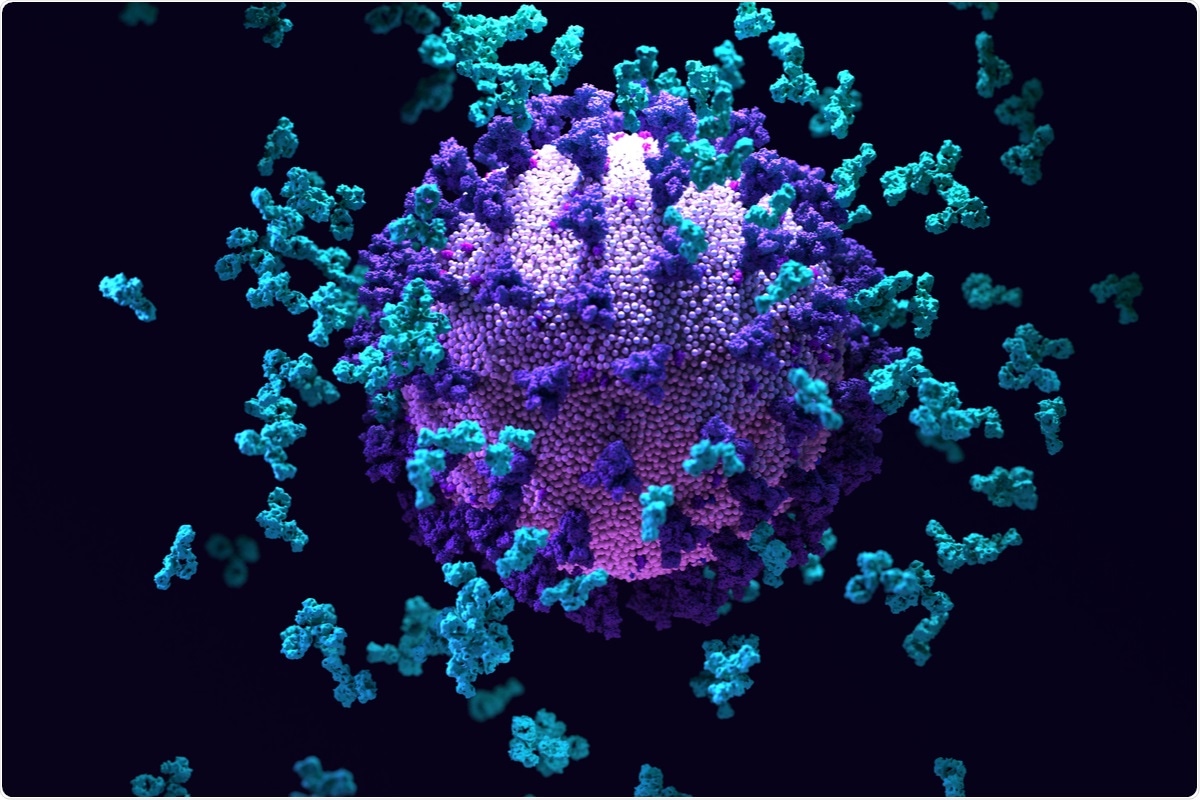
A team of scientists from A-Alpha Bio., USA, has recently conducted a large-scale screening of 33 therapeutic antibodies to examine their binding affinity to a number of severe acute respiratory syndrome coronavirus 2 (SARS-CoV-2) variants. The team analyzed the impact of potential mutations in the spike receptor-binding domain (RBD) on antibody efficacy. The study is currently available on the bioRxiv* preprint server.

Background
Therapeutic monoclonal antibodies developed against SARS-CoV-2 have shown significant efficacy in reducing coronavirus disease 2019 (COVID-19) severity and mortality both in clinical trials and real-world pandemic situations. Several antibody candidates are currently under phase 2 and 3 clinical trials, with some already received emergency use approval from health authorities worldwide.
The majority of therapeutic antibodies are designed to target the spike RBD of SARS-CoV-2 so that the interaction between RBD and host cell angiotensin-converting enzyme 2 (ACE2) can be disrupted. Therefore, it is evident that mutations arising in the spike RBD can potentially alter the RBD binding efficacy of antibodies. In this context, studies have shown that newly emerging SARS-CoV-2 variants with spike RBD mutations are capable of escaping antibody-mediated neutralization.
The study
In the current study, the scientists have examined the binding affinity of 33 therapeutic antibody candidates for a large panel of SARS-CoV-2 variants. Among tested antibodies, there are 9 clinically relevant antibodies, including Imdevimab, Casirivimab and Bamlanivimab.
Using the AlphaSeq assay, they have assessed more than 150,000 protein-protein interactions between the antibodies and most of the single amino acid substitution mutations present on the spike RBD. In the analysis, they have also included a number of predominantly circulating SARS-CoV-2 variants with multiple spike mutations.
Furthermore, they have analyzed the protein-protein interactions to identify major epitopes for each antibody, as well as to detect mutations responsible for a loss of epitope binding ability of each antibody.
Important observations
Initially, the scientists screened all tested antibodies against a site-saturation mutagenesis library containing about 75% of all single amino acid mutants of 165 sites within the spike RBD. They identified a number of RBD sites with different patterns of mutation sensitivity among antibodies. This observation highlights the epitope diversity among antibodies.
They analyzed each of these RBD sites to identify antibody-specific epitopes. Their analysis revealed that about 21 antibodies had putative epitope residues. They used previously known structures of antibody-RBD complexes to validate their findings.
Furthermore, they examined the binding of all tested antibodies and ACE2 against a panel of 34 spike RBD variants containing single, double, and triple mutations. The panel also included five recently emerged variants of concern (B.1.1.7, B.1.351, P.1, B.1.427, and B.1.429) and four related coronavirus RBDs.
The analysis revealed that all five variants of concern had significantly increased ACE2 binding affinity. Regarding antibodies, a wide range of binding to the tested RBD variants was observed.
By specifically analyzing the efficiency of 9 clinically relevant antibodies, the scientists observed no significant variation in binding affinities of Imdevimab, Casirivimab or Bamlanivimab for the B.1.1.7 variant. However, they detected a reduction in binding affinity of Casirivimab and Bamlanivimab for the B.1.351 and P.1 variants. A similar reduction in binding affinity they observed for Regdanvimab and COR-101 and Tixagevimab to the B.1.1.7, B.1.351, and P.1 variants and the B.1.351, and P.1 variants, respectively.
Regarding cross-reactivity, they observed that while Imdevimab, Bamlanivimab, Regdanvimab, Tixagevimab, Cilgavimab, and COR-101 were highly specific to SARS-CoV-2 spike RBD, Casirivimab, Sotrovimab, and Etesevimab showed different degrees of cross-reactivity to the RBDs of related coronaviruses, such as SARS-CoV-1, LYRa11, WIV1, and RaTG13.
Study significance
The study provides a detailed overview of the epitope specificity and binding affinity of 33 therapeutic antibodies targeting spike RBD of SARS-CoV-2. Moreover, the study characterizes the binding affinity of clinically relevant antibodies for newly emerged variants of concern, highlighting the impact of RBD mutations on antibody efficacy.
*Important Notice
bioRxiv publishes preliminary scientific reports that are not peer-reviewed and, therefore, should not be regarded as conclusive, guide clinical practice/health-related behavior, or treated as established information.
- Engelhart E. 2021. Massively Multiplexed Affinity Characterization of Therapeutic Antibodies Against SARS-CoV-2 Variants. bioRxiv. doi: https://doi.org/10.1101/2021.04.27.440939, https://www.biorxiv.org/content/10.1101/2021.04.27.440939v1
Posted in: Medical Science News | Medical Research News | Miscellaneous News | Disease/Infection News | Healthcare News
Tags: ACE2, Amino Acid, Angiotensin, Angiotensin-Converting Enzyme 2, Antibodies, Antibody, Assay, binding affinity, Cell, Coronavirus, Coronavirus Disease COVID-19, Efficacy, Enzyme, Mortality, Mutation, Pandemic, Protein, Receptor, Respiratory, SARS, SARS-CoV-2, Severe Acute Respiratory, Severe Acute Respiratory Syndrome, Syndrome

Written by
Dr. Sanchari Sinha Dutta
Dr. Sanchari Sinha Dutta is a science communicator who believes in spreading the power of science in every corner of the world. She has a Bachelor of Science (B.Sc.) degree and a Master's of Science (M.Sc.) in biology and human physiology. Following her Master's degree, Sanchari went on to study a Ph.D. in human physiology. She has authored more than 10 original research articles, all of which have been published in world renowned international journals.
Source: Read Full Article